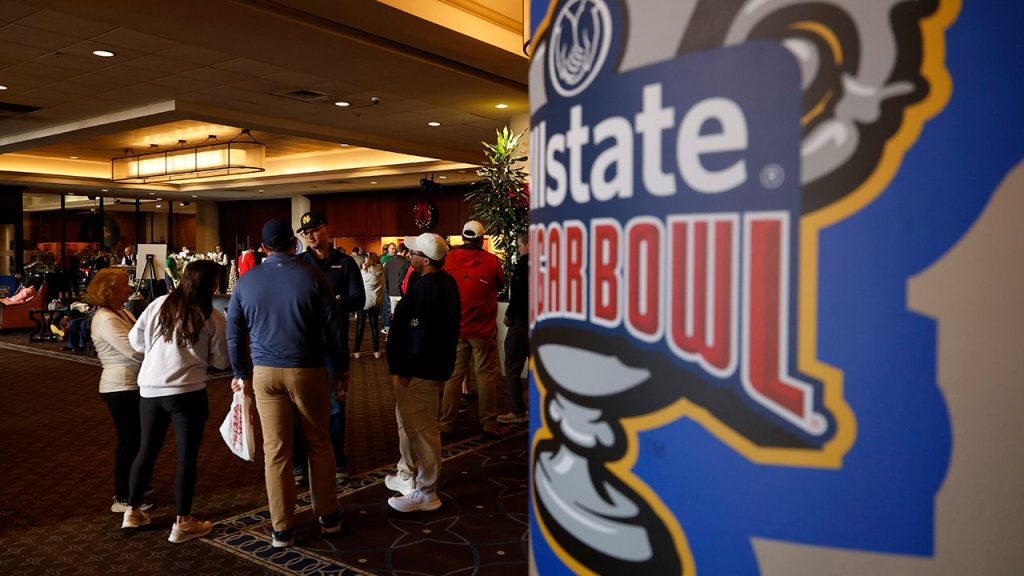The Sugar Bowl, a College Football Playoff quarterfinal matchup between the Georgia Bulldogs and Notre Dame Fighting Irish, was significantly impacted by a tragic terror attack on Bourbon Street in New Orleans. The attack, which occurred just days before the scheduled Wednesday game, resulted in over a dozen fatalities and numerous injuries, casting a somber pall over the highly anticipated sporting event. The proximity of the attack to the teams’ hotels and the active nature of the crime scene prompted officials to postpone the game to Thursday afternoon, disrupting travel plans for fans and creating logistical challenges for both universities.
The postponement triggered a wave of logistical complications for fans who had already traveled to New Orleans for the game. Many faced difficulties rebooking flights and adjusting accommodations, while others grappled with the financial implications of the delay. Some fans, like Lisa Borrelli, a Notre Dame alumna, accepted the postponement as necessary despite the financial losses incurred from non-refundable tickets and travel expenses. Others, like Darrell Huckaby, a Georgia resident, opted to return home, forfeiting the cost of his tickets due to the emotional impact of witnessing the aftermath of the attack and the uncertainty surrounding the game’s rescheduling. The incident underscored the fragility of life and the way in which unexpected events can overshadow even highly anticipated occasions.
The attack presented unique challenges for law enforcement and city officials who were tasked with ensuring the safety and security of the rescheduled game. Louisiana Attorney General Liz Murrill advocated for further postponing the game to Friday, citing the ongoing crime scene investigation and the need for a thorough assessment of the situation. This suggestion, while not ultimately adopted, highlighted the gravity of the situation and the delicate balance between proceeding with the event and respecting the victims of the tragedy. The incident also raised concerns about the long-term impact on the city’s ability to host major sporting events, including the upcoming Super Bowl LIX, scheduled to be held at the same venue.
The players and staff of both Georgia and Notre Dame found themselves in a state of lockdown following the attack, confined to their hotels and engaging in team meetings while awaiting further instructions. Georgia players were eventually able to conduct a walk-through practice at the Superdome, while Notre Dame players spent time with their families watching the Rose Bowl. The disruption to their routines and the emotional weight of the tragedy undoubtedly affected both teams as they prepared for the crucial playoff game. The universities prioritized the safety and well-being of their players and staff, while also acknowledging the importance of fulfilling their commitment to the Sugar Bowl.
The terrorist attack had a direct impact on the University of Georgia community, as one of their students was critically injured in the incident. University President Jere W. Morehead expressed his condolences to the victims and their families, emphasizing the university’s support for the injured student and their family. Both universities worked diligently to account for all team personnel and official travel party members, ensuring their safety in the wake of the attack. The incident served as a stark reminder of the vulnerability of large gatherings and the need for enhanced security measures at sporting events.
In response to the attack, security measures for the Sugar Bowl were significantly heightened. The security perimeter around the Superdome was expanded, and additional police officers were deployed to ensure the safety of attendees. The increased security presence aimed to deter any further threats and reassure fans and players alike. The incident evoked memories of the heightened security implemented for the first Super Bowl held in New Orleans after the September 11, 2001, terrorist attacks, highlighting the ongoing need for vigilance and preparedness in the face of potential threats. The Sugar Bowl became a poignant reminder of the intersection of sports and tragedy, demonstrating the resilience of the human spirit in the face of adversity.










